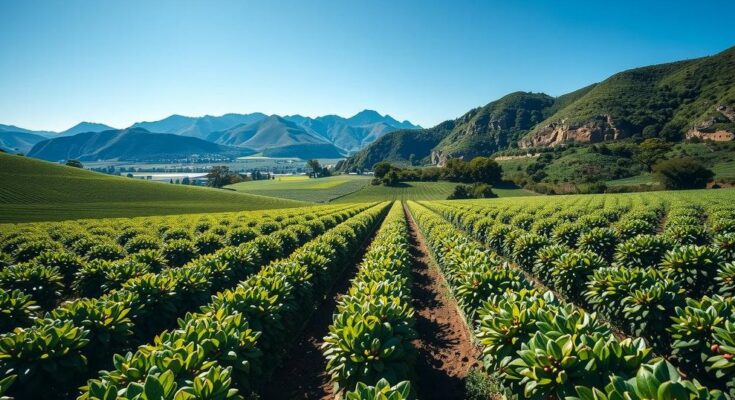Record coffee prices in the U.S. can be traced back to Brazil’s extreme climate challenges, with farmers facing severe drought and significant production declines. As a result, coffee has shifted from an everyday staple to a luxury item. Criminal activity has escalated, putting farmers and their livelihoods at risk, prompting them to enhance security measures.
Brazilian coffee has reached record prices, now averaging $7 per pound in American stores, largely due to challenging weather conditions impacting production. Augusto Rodrigues Alves, a coffee farmer in Brazil, expressed the difficulties he faces as he is unable to meet buyer demands, stating, “I do not have any coffee; I am out of stock, nothing, zero.” This scarcity is attributed to extreme temperatures and drought, significantly affecting Brazil’s coffee yields, especially as global demand continues to rise, particularly from China.
In addition to climate issues, some Brazilian farmers reported harvest reductions of up to two-thirds. Tiago Donizete Rodrigues, a farmer, said, “I am not going to be able to collect anything this year” and mentioned a need to buy coffee from others to meet customer commitments. Farmers are resorting to unusual measures, selling lower-quality coffee, referred to as “café porcaria,” that typically would not be sold in better years.
Coffee is ingrained in Brazilian culture, with a deep societal significance that transcends mere beverage consumption. For many, it is a fundamental part of daily life, with a native term for breakfast being “morning coffee.” The sustainable cultivation of coffea arabica, which comprises about sixty percent of global consumption, is under threat due to climate change, as optimal growing conditions become less prevalent.
Climate scientists predict that by the turn of the century, many areas in South America, including Brazil, may no longer be viable for coffee cultivation. This potential decline poses severe challenges, as farmers may need to shift to alternative coffee species, such as coffea canephora. Rodrigues Alves lamented that this should be a profitable time in coffee production, yet his stock is non-existent, highlighting the paradox facing farmers today.
Criminal activity surrounding coffee production is on the rise, with reports of considerable thefts experienced by farmers. In one instance, merchants allegedly stole over $10 million worth of coffee, with various organized crime groups targeting the valuable commodity. Detective Leandro de Prada Macedo Costa noted the emergence of a specialized criminal group, indicating a shift in illicit trade motivations.
Farmers in the region are increasingly concerned for their safety and the security of their crops, prompting them to implement heightened security measures. Fernanda Maciel, a farmer who lost the majority of her harvest, expressed her fears regarding criminality, stating they have increased fencing, dogs, surveillance technology, and are considering armed guards to protect their remaining crops.
Rodrigues Alves’s storehouse, once brimming with coffee, now contains only an insufficient twenty-five sacks. He emphasized the necessity of withholding coffee from the market for protective reasons, stating, “This is the thief’s coffee.” Protecting their resources underscores the daunting reality for Brazilian coffee farmers today.
In conclusion, the soaring price of coffee in America reflects both local challenges in Brazil and increasing global demand. Climate change drastically impacts coffee cultivation, leading farmers to face unprecedented hardships while also addressing threats from criminal activity. As traditional farming practices become compromised, the future of coffee production remains uncertain, prompting an urgent need for sustainable solutions and robust security measures to protect the dwindling coffee resources.
Original Source: www.bostonglobe.com




